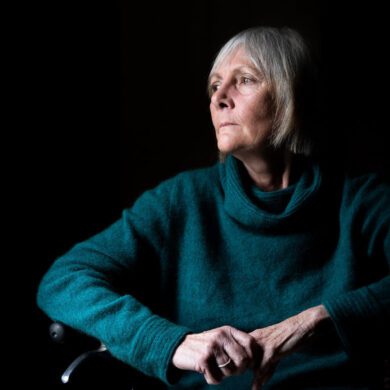If anyone needed persuading that there’s further reform necessary to support survivors of sexual violence through the court system, a new study in NSW should tip the scales.
Professor Julia Quilter from the University of Wollongong, and Luke McNamara from the University of NSW analysed transcripts from 75 sexual assault trials heard in the NSW District Court between 2014 and 2020.
They considered the impacts of changes to legislation over four decades to improve justice for victims, and reduce the influence of “rape myths”.
Their conclusion? Well, it turns out, changing laws doesn’t always change practice.
What are rape myths?
At the heart of many rape myths is the (false) idea of “real rape”. That’s a stereotypical version of the crime where the criminal is a stranger to his or her accuser, the crime itself happens in a public place, and there are injuries, or perhaps a weapon.
Rape Myth 1: That what a complainant is wearing is relevant
Professors Quilter and McNamara write they were surprised to see a strong focus in the cases they studied on what complainants were wearing including details of their underwear.
Why it’s irrelevant: Clothing is not some kind of code for whether you consent to have sex. Consent has to be actively communicated.
Rape Myth 2: That failing to resist means you’re not a real victim.
Why it’s irrelevant: Everyone reacts differently to trauma and violence. Some people might freeze. There’s no expectation of resistance in the law. The study quotes one court statement: ‘She doesn’t have to say no. She doesn’t have to fight him off. She doesn’t have to physically resist him. The question for you (the jury) to determine is whether she did, in fact, agree…’
Rape Myth 3: That a delay in reporting the rape suggests a lack of credibility
Why it’s irrelevant: Someone might delay reporting because they’re scared for their safety, or worried they won’t be believed. There are lots of reasons why someone might not report immediately.
Rape Myth 4: That inconsistent evidence means she’s lying
Why it’s irrelevant: As was observed in the closing address of one trial, ‘just because things aren’t remembered perfectly doesn’t mean we cannot know what happened in the past.’ Memory, recall and trauma research debunk the theory that inconsistency means someone is not telling the truth.
False perceptions of “real rape” persist
Dr Rachael Burgin is CEO of the national charity, RASARA, Rape and Sexual Assault Research and Advocacy. The results of the NSW study chime with her own work in Victoria several years ago.
“I’m not surprised because my study found the same problems in the Victorian context.”
She agrees the myths persist.
“Although there are these protections, for example rape shield laws, designed to limit a person’s sexual history or reputation being introduced as evidence, those narratives continue to be advanced.”
The NSW study found that in 50 per cent of cases, despite Rape Shield laws, evidence of past sexual experience was advanced.
Many of the reforms rolled out since the 1980s are designed to support victim-survivors. There are new amendments that broaden the definition of sexual intercourse and of consent; judges are empowered to give directions to the jury if there’s been a delay in reporting the crime, or the victim has changed her testimony; there’s now allowance made for evidence to be given via an AV link, rather than in person.
But it turns out, according to the analysis by Professors Quilter and McNamara, that in some cases, both the prosecution and defence regularly relied on rape myths, and even the attributes of “real rape”. They say complainants were cross-examined with an expectation of “immediate complaint, and a complete and consistent recall of events”.
What’s more, in some cases, complainants were accused of making up allegations; if they’d been drinking they faced ‘additional scrutiny’, including suggestions of ‘drunken consent’ and unreliability; and while there are strict guidelines that rule a person’s sexual experience out of bounds, defence counsel, the authors write, “were at times given wide latitude to question the complainant on a range of topics, including prior flirtatious behaviour.”
In their words
The study includes quotes taken from actual trials. Here’s a sample…
WHAT WERE YOU WEARING?
Crown Prosecutor: Were you fully clothed up until you arrived at the alleyway?
Complainant: Hold on one second.
CP: Sorry you don’t understand the question?
Complainant: No I don’t.
(In this case, the Crown asked the complainant 27 questions about what she was wearing.)
In another case, another complainant asked the judge the relevance of a question about what she was wearing.
Defence counsel: So you have a loose singlet top.
Complainant: Yes
Defence counsel: And loose shorts, when you arrived.
Complainant: Yes
Trial judge: Was it a loose singlet top?
Complainant: It was fitted but it wasn’t particularly… I don’t see the relevance of the question. I’m sorry.
(The study adds that most cross examination about clothing focuses on the mechanics of undressing, typically suggesting that the clothes (eg “skinny jeans”) were of a type that the victim must have assisted in removing them – indicating consent.)
DID YOU RESIST?
Crown Prosecutor: At any point did you yell or try to hit him or anything like that?
Complainant: No, I did try to push him away, but every time I did raise my voice, or try to hit him – his temper would escalate.
(The definition of consent has been changed to focus not on resistance, and injuries; but on whether there was free and voluntary agreement)
DELAY IN COMPLAINT
Defence counsel: You didn’t immediately respond by text, “I’ve been raped”, did you?
‘People don’t believe people”
Despite the reforms undertaken since the 1980s, the rates of reporting are still very low in Australia. Last year, only 16 percent of adults who’d faced sexual violence contacted police.
Dr Burgin, of ANSARA, asks, “Why would you when rape has been effectively decriminalised in this country… you just need to open your phone to any social media platform, and you’ll see that. People don’t believe people. ”
Why would you [report] when rape has been effectively decriminalised in this country?
“The way we treat survivors in Australia is abysmal. It is a stain on our country – that we platform abusers, and not only silence survivors, we crush them. We extinguish any light left within them.”
The NSW study found “rape myths” and stereotypes about how a “genuine” victim of sexual violence should behave featured prominently in the trials that were examined.
The authors say there’s only limited evidence that reforms have improved sexual offence trials; for real improvement, they say outdated practices and narratives need to change.












No Comments